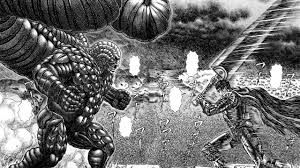Berserk: Duality in everything
- Stephanie
- 26. juli 2019
- 3 min lesing
Oppdatert: 2. aug. 2019
I've kind of had a problem with writing actual analysis of shows. Most of the time, what I write just ends up being "I like it here are a few reasons why", which, Isn't necessarily a bad thing, It's just not what I wish I was doing. But doing actual analysis is hard. You gotta think and stuff, and it's not often you even find something in a show to analyse. I might be able to see that "hey, this show has these themes and tries to get this message across", but I woudn't really call that analysis. I mean it is, but it's not the super in depth stuff I wish I was capable of doing. Well, I've been reading Berserk, and one thing in particular caught my eye. Every villain in the series has a dual personality.
I don't mean as in multiple personality disorder, I just mean in the way they present themselves. The first example of this can even be found in The Black Swordsman Arc, though to a lesser extent that later in the series. The Slug Baron is a ruling Count who executes many of his people on accusations of heresy, though whether they actually are a heretic or not doesn't really matter to him. Basically, the dude is a dictator who kills random people whenever he feels like it. Yet in spite of this, he has a daughter who he wishes would see him as a loving father. He tries to present himself as a nice person to her, even though he reguarly kills innocent people. At the end of the story arc, his daughter sees her dad's true form, as he is actually an apostle who sacrificed his wife in exchange for power.
The next example can be seen in the Lost Children Chapters of the Conviction Arc, where supposed fairyes have been terrorizing a village, killing their livestock and taking their children. In the village, Guts meets a child named Jill, who claims that she felt that the large fairy who invaded her village is actually her long lost friend Rosine. Guts later leaves Jill by herself, as she sees her as a nuisance. While Guts travels to the forest where the fairies reside, Rosine, who has sacrificed her parents in exchange for power, is showing Jill the wonders of the forest where they live. They play for as long as they want, and there are no annoying adults anywhere. However, Jill sees the elves playing a war game, and is horrified to find out that the faires kill each other in fun, as they feel no remorse. With each new revelation about the place, Jill becomes more scared and wants to leave. However, Rosine tries to keep her in the forest, wanting to turn her into a fairy. When Guts arrives, he ends up killing Rosine, and burning down the forest.

Another instance of this duality is seen in the final parts of the Conviction Arc, where the priest known as Mozgus is out hunting heretics with his personal group of torturers. I don't think I need to point out where the duality in this is, but Mozgus later transforms into a bestial version of himself, even gaining wings and the power to fly. Even though Mozgus talks about the greatness of his God, he has a cellar in the Tower of Conviction where he tortures heretics.

Though the most obvious of this concept of duality is seen in the two main characters themselves, Guts and Griffith. Guts is clad in all black armour, and wields a massive, intimidating sword. While Griffith on the other hand, wears white armour, and uses a thin rapier in battle. This contrast is especially integral to the story, as even though Griffith is presented as a fairy tale hero, he is the one who ends up sacrficing the Band of Hawk, and generally just kills a ton of people for no other reason than to further his quest.
Well, that's really all I have to say about it. Most people probably got this, but I thought it was neat.




Kommentarer